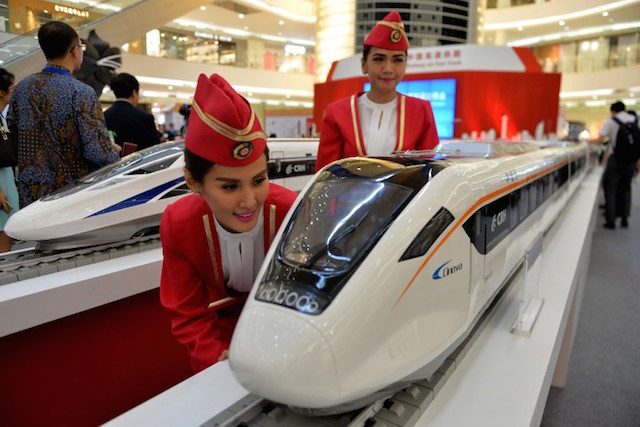SUMMARY
This is AI generated summarization, which may have errors. For context, always refer to the full article.

JAKARTA, Indonesia – Just 3 months after striking a deal with China, Indonesia and the superpower are set to start construction for the high speed train that saw Japan lose out on a $5.5-B deal.
The ground breaking will take place on January 21 in Walini Plantation, West Java, one of the station stops on the Jakarta-Bandung railway, said Chinese ambassador to Indonesia — on Tuesday, January 19. (READ: China, Japan battle to build Indonesia’s first bullet train)
China State Councilor Wang Yong will head the Chinese delegation while President Joko “Jokowi” Widodo will be present at the event.
The ground breaking, said Chinese ambassador to Indonesia Xie Feng, shows the strong relationships between China and Indonesia. (READ: Indonesia defends railway project after ambiguous bidding angers Japan)
“The Jakarta-Bandung high speed railway is the first in Indonesia as well as in Southeast Asia. The two sides started discussions last March so it was now, less than 10 months,” he told Rappler.
“But the groundbreaking will take place (soon) so this is really very encouraging because it sends out the message that China and Indonesia are very serious on coordinating our respective development plans. We are very serious about expanding our cooperation.”
He added, “Usually they say after the signing of the agreement it will take about half a year to make preparation for the real groundbreaking and this time we only take 3 months so this is really an example of the efficiency of china-indonesiga cooperation and another example of the high-speed efficiency which is required and which is the characteristic of a high speed railway.”
The ambassador acknowledged challenges to the project saying high-speed railway construction is usually “time costly,” but he expressed confidence they would finish the railway not just on time but “in a first-class manner.”
Daily passenger flow could reach 44,000 on average per day, according to Bandung Institute of Technology. A fare of 200,000 Rupiah, could also mean an annual fare income or 3.2 trillion rupiah, adding the railway “will inject new impetus into Indonesian economy.” The combined population of Jakarta and Bandung is more than 14 million.
Xie also mentioned that President Xi Jinping and Jokowi “have met each other 4times, and exchanged 2 telephone conversations.”
“One theme that runs all the way through is to find ways to promote the 21st Century Maritime Silk Road Initiative and the Global Maritime Fulcrum in a synchronized manner and to deepen and expand our practical cooperation in various fields. It is in this broad context that Jakarta-Bandung came into reality.”
China vs Japan
Analysts have said that the deal signifies China’s influence on Indonesia, and the decreasing power of Japan over the largest nation in Southeast Asia – after Beijing beat Tokyo to win the construction project.
The line will connect the Indonesian capital Jakarta with the mountain-fringed city of Bandung, some 160 kilometers (100 miles) away, and is a key part of President Joko Widodo’s plans to overhaul the archipelago’s infrastructure and attract investors.
Japan was long expected to build the railway but China entered the contest earlier this year, and Tokyo’s bid was rejected last month after a chaotic bidding process that infuriated the Japanese. (READ: Indonesia’s bullet train deal with China: ‘Delusional,’ no coordination)
State-owned China Development Bank will provide 75% of the funding, with the rest coming from the Chinese railway company and Indonesian consortium.
The railway line will not need any financing from the Indonesian government, nor a government guarantee. One reason that Indonesian officials gave for rejecting the Japanese bid was that it would require government funding.
The high-speed train route will cover 8 stations from Jakarta to Bandung, and the train will travel at around 250 kilometers (150 miles) an hour.
The Indonesian government repeatedly changed its mind about the railway project, before eventually agreeing to accept China’s bid for a high-speed line. (READ: Indonesia’s bullet train deal with China: ‘Delusional,’ no coordination)
The chaotic bidding process and final decision angered Tokyo, which is increasingly competing with Beijing for influence in Asia, with chief government spokesman Yoshihide Suga slamming it as “extremely regrettable.”
Japan’s loss came despite its reputation as a world-class train maker, famed for its “shinkansen” bullet trains.
China has built thousands of kilometers of high-speed railway in recent years, but its safety standards have come under scrutiny – a 2011 crash killed at least 40 people and injured about 200. – Rappler.com/with reports from Agence France-Presse, Uni Lubis and Natashya Gutierrez
READ MORE:
Add a comment
How does this make you feel?
There are no comments yet. Add your comment to start the conversation.